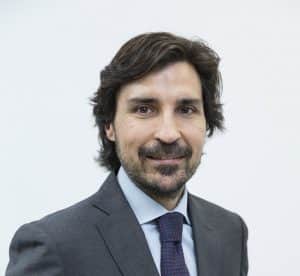"Active management is more important than ever before"

Redacción Mapfre

You were recently promoted to the position of assistant general manager. Congratulations on the move. Can you tell us a little about what you did before and what your new responsibilities are now?
My previous role involved leading the fixed income department for Discretionary Portfolio Management. In the new role, I’m taking on responsibility for investments in fixed income and European equities, both for the insurance companies and for investment and pension funds. It’s going to take some time to configure the process correctly, but I know I can count on great support from experienced and talented people like Carmen Mondéjar, Cristina Benito, Manuel Rodríguez and David Iturralde and the rest of their teams. In addition, I’ll continue supporting the Corporate Investment Area, coordinating the supervision of the financial investments we have in Latin America with Estanislao del Campo.
When did you join MAPFRE AM and how would you assess the period you’ve been working here?
I joined MAPFRE INVERSIÓN in April 2002 and in 2018 I became part of MAPFRE AM. Overall, I see the more than 20 years that I’ve been working here as very satisfactory, both personally and professionally, largely thanks to the teamwork culture that’s encouraged at MAPFRE AM as well as with other group companies or business areas.
Also, continuous learning is a vital part of an investment manager’s job. Keeping up to date with what’s going on in terms of the investment alternatives that emerge in increasingly developed, sophisticated and global financial markets is essential and that helps you to sharpen your edge.
You have extensive knowledge of fixed income. What are the prospects like for this market at a time of such high inflation and aggressive rate hikes?
Central Banks have reiterated on numerous occasions that the risk of not tightening their monetary policy enough is greater than the risk of overdoing it, despite the fact that they could significantly erode growth in the main developed economies. We believe that given the target level for intervention rates that the market is currently discounting for mid-2023 (European Central Bank 3.00%; US Federal Reserve 5.00%), the upward path of interest rates should be limited, and we could see a fall in yields in the bond market as long as two things happen - inflation expectations are controlled and there is a substantial slowdown in economic growth together with a looser labor market.
Is there a risk of large imbalances as a direct consequence of these liquidity restrictions?
It’s a risk that shouldn’t be underestimated, despite the fact that Central Banks have shown in recent years that they are capable of handling the stressful situations which we have found ourselves in, such as the financial crisis, peripheral debt crisis, COVID-19, the Ukraine conflict etc.
The coexistence of a restrictive monetary policy on the part of the Central Banks (raising intervention rates and withdrawing their purchase programs) and the appreciation of the dollar are the two main causes behind a tightening of access to financing for companies, especially in Europe.
However, looking at the big picture, companies are showing lower leverage levels than in previous recessionary economic cycles, and we have much better capitalized financial companies.
What qualities does a fund manager need to have to deal with a context as complicated as the one ahead?
I firmly believe that a good fund manager must possess qualities such as experience, training, analytical capacity and a culture of teamwork, all of which are amply visible across the MAPFRE AM ranks.
How important is value and active management in this same context?
Against the current market backdrop, where we’re dealing with episodes of high volatility and a lot of uncertainty, active management is more important than ever.
Despite the fact that we’ll see an increase in corporate default rates and a drop in enterprise operating margins, we believe that the current market also presents interesting opportunities to add to portfolios, both in fixed income and in equities.
Value investing is an investment philosophy that seeks to generate positive returns consistently over the long term, based on the acquisition of quality securities with a built-in margin of safety at a price below their intrinsic or real value.
Our objective is to produce returns in the medium to long term by trying to find good companies that are well positioned in their sectors, with high barriers to entry, lasting competitive advantages, and an experienced management team.
What investor profile are fixed income funds aimed at?
There is a misconception that fixed income funds are “fixed” and intended only for investors with a conservative profile, but that’s not necessarily the case, as this year has shown us, with the significant bounce in interest rates and credit spreads.
Every investor or saver must be aware of the level of risk they are assuming when they buy a particular financial product. To do this, it’s essential to segmentation the client correctly and identify their risk profile, which, as defined by the CNMV itself, is "the relationship that exists between the risks that the investor is willing to assume and the returns that they hope to obtain.”
Let's talk a little about the fixed income products that we offer at MAPFRE AM.
At MAPFRE AM, through our catalog of investment funds, pension funds and life-savings products, we can satisfy the demand of our retail and institutional clients based on their appetite for risk and particular needs.
The range of products we offer is broad, ranging from more conservative products that aim to preserve capital (monetary funds, guaranteed funds), to products with a higher risk such as mixed funds and the Global Bond Fund or more thematic funds such as our Capital Responsable Fund.
MAPFRE AM also manages the Group's portfolio. Insurers invest a very high percentage of their balance sheet in fixed income. How do you manage a such enormous sums?
We manage around 30 billion euros of financial investments on behalf of the group's insurance companies (Life and Non-Life) resident in the European Union.
I would actually say that, more than volume of funds under management, the real complexity derives from the diversity of portfolios that we manage with the different types of products that they cover, especially in the Life insurance companies.
The investment manager of an insurance company, complementing the analysis of the financial risks and ESG that any investment entails, must consider a series of additional conditions: regulatory, Solvency II, accounting criteria, etc.
Hobbies
What are your hobbies?
I try to play sports whenever I can, mostly paddle, basketball or football. I also enjoy cooking and spending time with family and friends, especially with my wife and three daughters.
Do you have a favorite dish?
I really love hearty food and traditional homemade food, like what I’ve eaten all my life. If I had to choose just one dish, it’d be gazpacho, no question about it.
Name a city and country that you love visiting.
In terms of cities, I’m torn between Chicago and London. But for nostalgic reasons, I’ll have to go with Talavera de la Reina, a favorite meeting point to catch up with my friends and family.
As for a country, there’s no doubt about it – Spain is the one for me.
What about music? Any favorites?
I don't really have any firm favorites - the music I listen to depends on where I am or what I’m doing.
From the pop/rock of the 80s and 90s, through to the British music that my close friend and music lover Samuel instilled in me when I was a teenager, and to more commercial and current pop music that I listen to with my daughters. Of course, a party’s not a real party without a good dose of “pachanga”!



